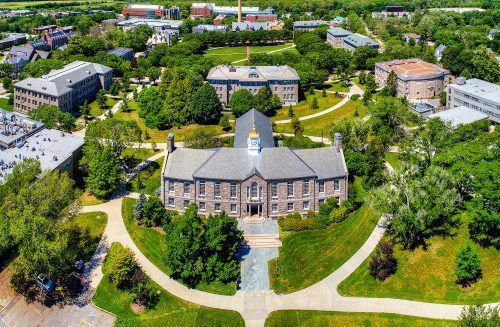Gives students opportunities to combine interests
The few. The proud. The Green Business Program at URI is one of only a handful in the country. Photo from thewesterlysun.com.
Since 2013, the University of Rhode Island has offered a cutting-edge Green Business Program, one of only a few in the country, that is often overlooked at the University.
The Green Business Program, which is a partnership between the College of Business and the College of Environment and Life Sciences, allows students to earn a degree from both colleges in four years. The program only takes five more credits than a normal degree, which takes 120 credits.
The program is specifically designed for students with an interest in business and who care about the environment and issues like global warming. In the long term, the program’s goal is to train the business workforce to work in an environmentally sustainable manner.
“We noticed that Fortune 500 companies were opening sustainability offices and looking for sustainability officers,” Simona Trandafir, the head of the Green Business Program, said. “Companies were making clear goals to improve their own economic footprint but they needed people that understood environmental issues as well as business issues.”
Trandafir said that faculty from both colleges noticed this emerging trend that linked their departments together and wanted to meet the new developments in the business world head-on. The faculty then worked together to create a curriculum that fulfilled the criteria for both major clusters.
The initial plan behind the Green Business program was successful in its goals, so the professors decided to create another dual-degree program titled Green Marketing.
According to Trandafir, if one of the degrees does not help a student in their career path, they can fall back on the other degree, which can open a lot of opportunities in the job market.
Many alumni of this program have been successful in entering into what is a relatively untapped career path. Some are currently working at companies such as Usource Energy and Ecogy Energy, both of which focus on creating and improving renewable energy sources and implementing them nationwide.
Current students and alumni are allowed to take on both business and environmental internships at a variety of companies.
“Some students have worked on farms and [gained] experience with customer interactions through farmers markets and the product interaction between farms and customers,” Trandafir said.
Farming combines aspects of both business and environmental studies, including aspects such as selling products and meeting the food needs of a community. The success of the agricultural industry varies greatly based on the way that the environment affects their crops. Droughts and other climate-related issues can lead to awful consequences for farmers if they don’t know solutions or other methods to keep their crops healthy.
The program is still relatively small, which Trandafir credits to the lack of promotion for the program. Due to this, few students enroll in the program, as they don’t even know it exists. According to Trandafir, only about 10 new students enroll each year.
Current students have many positive things to say about the program. One student even said switching to the program was the best decision he has made in college.
Virginia Smith, a sophomore in the program, said she would recommend this major because of the thorough knowledge you get of business and economics, while still being able to learn about environmental issues that will affect the business world and beyond in the future.
Aiden McCaughey, a fifth-year student at URI and another member of the program, credited the program for helping him get involved with the URI Energy Fellowship which focuses on experiential learning in renewable energy.
“The fellowship program provided me with a full-year internship with Green Development, LLC, an in-state renewable energy developer,” he said.
Trandafir believes that the need for these kinds of degrees will only continue to grow.
“We live in a world in which a lot of environmental issues have arisen,” she said. “[It will be] really good for a business perspective to have someone who is knowledgeable about what policies are available and how to approach economic issues in sustainable ways.”

